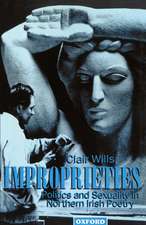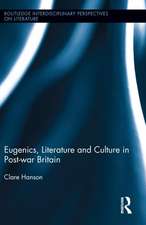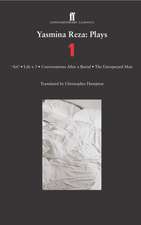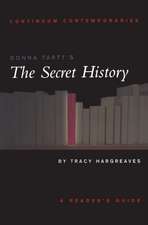Cartographic Strategies of Postmodernity: The Figure of the Map in Contemporary Theory and Fiction: Routledge Studies in Twentieth-Century Literature
Autor Peta Mitchellen Limba Engleză Paperback – 10 feb 2012
| Toate formatele și edițiile | Preț | Express |
|---|---|---|
| Paperback (1) | 415.25 lei 43-57 zile | |
| Taylor & Francis – 10 feb 2012 | 415.25 lei 43-57 zile | |
| Hardback (1) | 1108.37 lei 43-57 zile | |
| Taylor & Francis – 7 sep 2007 | 1108.37 lei 43-57 zile |
Din seria Routledge Studies in Twentieth-Century Literature
-
 Preț: 295.33 lei
Preț: 295.33 lei -
 Preț: 311.41 lei
Preț: 311.41 lei -
 Preț: 310.70 lei
Preț: 310.70 lei - 9%
 Preț: 1005.31 lei
Preț: 1005.31 lei -
 Preț: 155.20 lei
Preț: 155.20 lei -
 Preț: 309.59 lei
Preț: 309.59 lei - 18%
 Preț: 706.91 lei
Preț: 706.91 lei -
 Preț: 447.51 lei
Preț: 447.51 lei -
 Preț: 482.78 lei
Preț: 482.78 lei -
 Preț: 277.17 lei
Preț: 277.17 lei - 15%
 Preț: 210.15 lei
Preț: 210.15 lei - 18%
 Preț: 1062.26 lei
Preț: 1062.26 lei - 18%
 Preț: 1065.40 lei
Preț: 1065.40 lei -
 Preț: 446.32 lei
Preț: 446.32 lei - 18%
 Preț: 1003.30 lei
Preț: 1003.30 lei - 18%
 Preț: 1052.35 lei
Preț: 1052.35 lei -
 Preț: 305.83 lei
Preț: 305.83 lei - 18%
 Preț: 1053.16 lei
Preț: 1053.16 lei -
 Preț: 431.35 lei
Preț: 431.35 lei - 18%
 Preț: 1109.18 lei
Preț: 1109.18 lei - 18%
 Preț: 1115.33 lei
Preț: 1115.33 lei - 18%
 Preț: 1060.19 lei
Preț: 1060.19 lei - 18%
 Preț: 1058.10 lei
Preț: 1058.10 lei -
 Preț: 444.51 lei
Preț: 444.51 lei - 18%
 Preț: 1054.71 lei
Preț: 1054.71 lei -
 Preț: 445.89 lei
Preț: 445.89 lei - 18%
 Preț: 1058.79 lei
Preț: 1058.79 lei - 18%
 Preț: 1057.40 lei
Preț: 1057.40 lei - 18%
 Preț: 1062.26 lei
Preț: 1062.26 lei -
 Preț: 429.23 lei
Preț: 429.23 lei -
 Preț: 464.54 lei
Preț: 464.54 lei - 18%
 Preț: 1053.92 lei
Preț: 1053.92 lei - 18%
 Preț: 1118.46 lei
Preț: 1118.46 lei - 18%
 Preț: 1115.33 lei
Preț: 1115.33 lei - 26%
 Preț: 820.73 lei
Preț: 820.73 lei - 18%
 Preț: 1114.98 lei
Preț: 1114.98 lei - 18%
 Preț: 1166.32 lei
Preț: 1166.32 lei - 18%
 Preț: 1057.40 lei
Preț: 1057.40 lei - 18%
 Preț: 1103.85 lei
Preț: 1103.85 lei
Preț: 415.25 lei
Nou
Puncte Express: 623
Preț estimativ în valută:
79.47€ • 82.46$ • 66.42£
79.47€ • 82.46$ • 66.42£
Carte tipărită la comandă
Livrare economică 17-31 martie
Preluare comenzi: 021 569.72.76
Specificații
ISBN-13: 9780415809122
ISBN-10: 0415809126
Pagini: 230
Dimensiuni: 152 x 229 x 12 mm
Greutate: 0.28 kg
Ediția:1
Editura: Taylor & Francis
Colecția Routledge
Seria Routledge Studies in Twentieth-Century Literature
Locul publicării:Oxford, United Kingdom
ISBN-10: 0415809126
Pagini: 230
Dimensiuni: 152 x 229 x 12 mm
Greutate: 0.28 kg
Ediția:1
Editura: Taylor & Francis
Colecția Routledge
Seria Routledge Studies in Twentieth-Century Literature
Locul publicării:Oxford, United Kingdom
Public țintă
PostgraduateCuprins
List of Illustrations Preface Introduction: Text–Map–Metaphor 1. A Genealogy of Cartography, A Genealogy of Space 2. Subjectivity: The Cartographer as Nomad 3. Mapping the Labyrinth: Twentieth-Century Cartography and the City 4. Metamorphoses of the Map. Notes Bibliography
Notă biografică
Peta Mitchell is a lecturer in the School of English, Media Studies, and Art History at The University of Queensland.
Recenzii
"Cartographic Strategies of Postmodernity is one of the most impressive pieces of scholarly work I have read in years. It is strikingly innovative—and that is no mean trick given that the topic has been much discussed recently. What makes this study so important—that is, such a major contribution to the field—is its remarkable combination of meticulous research, wide philosophical scope (from Descartes through to Baudrillard), theoretical sophistication (regarding theorists ranging from Benjamin to Foucault), and what I can only call brilliant close readings of literary texts. I should add that, to my knowledge, this is the first full and serious study of the postmodern cartographic imagination and it is certainly the first to set it in its rich historical and theoretical context. . . . When it is published, as I am certain it will be, it will make its (large) mark on the (large) field of postmodern studies." --Linda Hutcheon, University of Toronto
"Cartographic Strategies of Modernity counts among the most telling treatments of cartography, metaphor, and space available in English. It is complete in itself, of a totality that it might prefer not to own but for which every one of its readers will be grateful. . . . it is a guide, indeed a viaticum, for the reading of space in contemporary theory and fiction." --Tom Conley, Professor of Romance Languages and Professor of Visual and Environmental Studies, Harvard University
"This is an exciting book addressing the changing spatiality of literature in current times. An innovative account of the ‘spatial turn’ and its significance in contemporary cultural studies, using cartographic metaphor and practice to illuminate current theorisation. It develops a leading account of the blending of cartographic and literary imaginaries in postmodern culture, offering an exciting journey in which the social theory of representation is reframed by locating its spatial performativity. It will be an asset to readers in fields from literary studies, to cultural studies to geography." --Mike Crang, Reader in Geography, Durham University
"Cartographic Strategies of Modernity counts among the most telling treatments of cartography, metaphor, and space available in English. It is complete in itself, of a totality that it might prefer not to own but for which every one of its readers will be grateful. . . . it is a guide, indeed a viaticum, for the reading of space in contemporary theory and fiction." --Tom Conley, Professor of Romance Languages and Professor of Visual and Environmental Studies, Harvard University
"This is an exciting book addressing the changing spatiality of literature in current times. An innovative account of the ‘spatial turn’ and its significance in contemporary cultural studies, using cartographic metaphor and practice to illuminate current theorisation. It develops a leading account of the blending of cartographic and literary imaginaries in postmodern culture, offering an exciting journey in which the social theory of representation is reframed by locating its spatial performativity. It will be an asset to readers in fields from literary studies, to cultural studies to geography." --Mike Crang, Reader in Geography, Durham University
Descriere
Charting the use of cartographic metaphor in postmodern literature and theory, Mitchell argues that the ongoing reworking of the map metaphor renders it a formative and performative metaphor of postmodernity. This metamorphosis draws together poststructuralist conceptualizations of epistemology, textuality, cartography, and metaphor, and signals a shift away from modernist preoccupations with temporality and objectivity to a postmodern pragmatics of spatiality and subjectivity.














